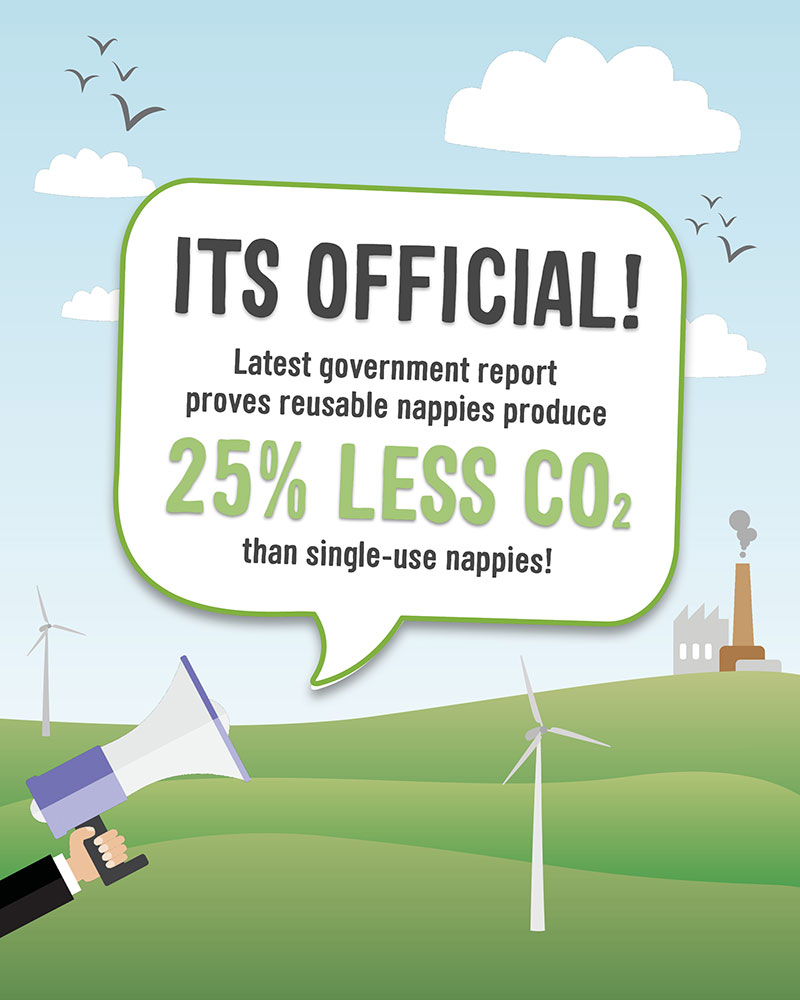
Jun 27, 2023 | BLOG
Our member Bambino Mio writes about their newly-launched petition.
The majority of parents and parents-to-be believe that climate change poses a threat to their children’s future with 86% of parents saying the government needs to do more to reduce nappy waste. It is a well know fact that single-use plastics are directly linked to climate change as they are produced using fossil fuels, through a process that emits huge amounts of greenhouse gases. Single-use plastics are one of the worst pollutants on our planet as they continue to create greenhouse gas emissions long after they have been discarded – which for single-use nappies is around 500 years!
SIGN OUR PETITION
Disposable nappies are a single-use plastic!
Every day in the UK 10 million single-use plastic nappies are incinerated or end up in landfill. That’s a staggering 250 million every day around the world! One of the most environmentally friendly things we can do is reuse the things we buy. Reusable nappies are the answer to the nappy waste crisis, but parents and caregivers need support to make the transition.
It’s time to trigger a national conversation about how the nappy waste crisis is a crucial part of the reduction of single-use plastic and fight against climate change.

Babies demand to be heard
On Monday 26th June, we took a bunch of little revolutionaries to Parliament Square, London, in a protest to raise awareness of the devastating impact of single-use nappies. Sporting babygrows and trailblazing tees with protest slogans including ‘My nappy’s rubbish’, ‘Our future’s not disposable’, and ‘It’s my planet and I’ll cry if I want to’ – Bambassadors™ as young as four months took a stand against the environmental devastation caused by single-use nappies, demanding immediate change to protect their futures.

It’s time for change
We’re ready to fight the problem head-on, to draw attention to this huge issue, increase public awareness and put pressure on decision-makers to address the problem. We’re fighting on behalf of those who can’t yet speak up for themselves, and we have started a petition calling on the government to urgently take action.
The Petition
It’s time for change and the government needs to make the nappy waste crisis a priority. We have listened to the concerns of parents across the country and are taking the lead with this conversation by launching a petition, calling for the Government to create a national strategy to reduce nappy waste in line with other single-use plastic targets.
Sign the petition to show your support and tell the Government that we need a national strategy to reduce nappy waste NOW!
SIGN OUR PETITION

Sep 14, 2022 | BLOG
Guest Blog by Helen Rankin

Helen Rankin, Founder – Cheeky Wipes
As the founder of Cheeky Wipes, I am often asked if reusable wipes are worth it. The answer is obviously yes!

Costs of disposables wipes have soared- this was a local “Big Six” supermarket over the summer showing the cost for just a single pack of branded wipes
Swapping to reusable wipes could save the average family up to £30 a month for several years. Disposable wipes add between £5 and £10 (based on ‘premium’ branded wipes) to family shopping baskets weekly. Switching to reusable wipes isn’t just better for our planet but with prices starting from around £18 for a pack of 25 wipes, they can save hundreds of pounds whilst your child is in nappies – and beyond!
As members of the Nappy Alliance, we understand that the cost of living has increased dramatically over recent months, both here in the UK and globally too. Food banks are reporting that families are spending £30 a month on disposable baby wipes, leaving them without money to feed their families.
Experts assume that children will be in nappies for around 2.5 years. Depending on whether they buy branded or non-branded disposable wipes, this could amount to £258.96 annually, or £647.40 for just one child.
We estimate that the average family will use 260 packs of disposable baby wipes over 2.5 years, if they’re buying two packs of wipes per week. They could use a LOT more if they continue using them as hands and faces wipes too.
Shrinkflation is affecting parents who buy wipes too – this is when manufacturers keep the cost of a product the same, but reduce the amount / weight that consumers receive. We’ve seen this with disposable wipes manufacturers steadily reducing the number of packs of wipes per packet. A year ago, the regular amount of wipes per pack was 72. Now due to shrinkflation, the standard amount is 56, or 60 if you’re lucky, a 20% decrease. It’s a sneaky trick because often consumers see that the price is staying the same, not realising that per wipe, the costs have effectively increased by 20%.
Switch to reusables to save
The ‘average’ UK family could potentially save between £300 and £600 by switching to reusable wipes. Reusable wipes cost around £25 for 25 reusable wipes, to £50 for a reusable baby wipes kit which contains everything you need to make switching to reusable wipes easy.
Many families are worried about energy costs at the moment, and are worried there could be more costs associated with washing, but this can be very low depending on the size and energy efficiency rating of your washing machine. Reusable wipes don’t need a separate wash though, and annually, washing costs are just £5. That’s based on the following assumptions:
- 25 wipes weighing 250g washed every other day as part of a full 7kg washload
- Number of additional washloads annually is 6
- Electricity costs (October 2022) of 34p per kw, cost from 26p per load for a ’D’-rated washing machine, to 15p per load for an ‘A’ rated washing machine, average 20p
- Cost of washing powder (persil) is 15p per washload
- Total cost of washing reusable wipes is approximately 35p per additional load, so £2.10 per annum
Drying 25 reusable wipes are part of a full drying load (7kg – 9kg) every other day for a year will cost an incremental £6 per annum. The cost of drying reusable wipes varies, depending on how you dry them. If you only tumble dry your washing, then the cost of drying one 9kg load of drying will vary from 60p for a heat pump dryer to £1.50 for a vented tumble dryer, average £1.10

Reusable wipes are easy to care for and can be washed alongside other laundry including reusable nappies
Because the wipes only make up a small percentage of this load, this equates to just an additional £6 approximately over the course of a year.
It’s worth noting that very few families use their tumble dryer year round. Many people line or air dry if possible, so this amount could well be reduced by half, to just £3 per annum.
If a family uses two packs of disposable wipes per week, a comparable amount of reusable wipes would be 50 wipes, priced from around £37. Generally a nappy change will require fewer reusable wipes than disposable wipes, as reusables tend to be grippier and make nappy changing quicker and easier.
Not just the cost savings!
Disposable wet wipes have a massive impact on our environment. If flushed, they pollute our rivers and waterways, creating giant stinking fatbergs and actually disrupting the course of the Thames. MP Fleur Anderson has been vocal in asking for wet wipes containing plastic to be banned.
Biodegradable and ‘flushable’ wipes are kinder to the environment however they still can take up to 12 weeks to decompose. And that’s in prime ‘composting’ conditions, not in landfill in a plastic nappy sack!
Obviously reusable wipes are the BEST plastic free wipes and as they can be washed and reused are a much more eco friendly option.





 Reusable Nappies – Save Money and Reduce Single-Use Plastic
Reusable Nappies – Save Money and Reduce Single-Use Plastic

 It’s official – New Defra LCA report confirms reusable nappies are best for the environment.
It’s official – New Defra LCA report confirms reusable nappies are best for the environment.

